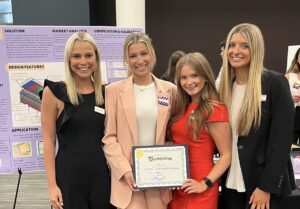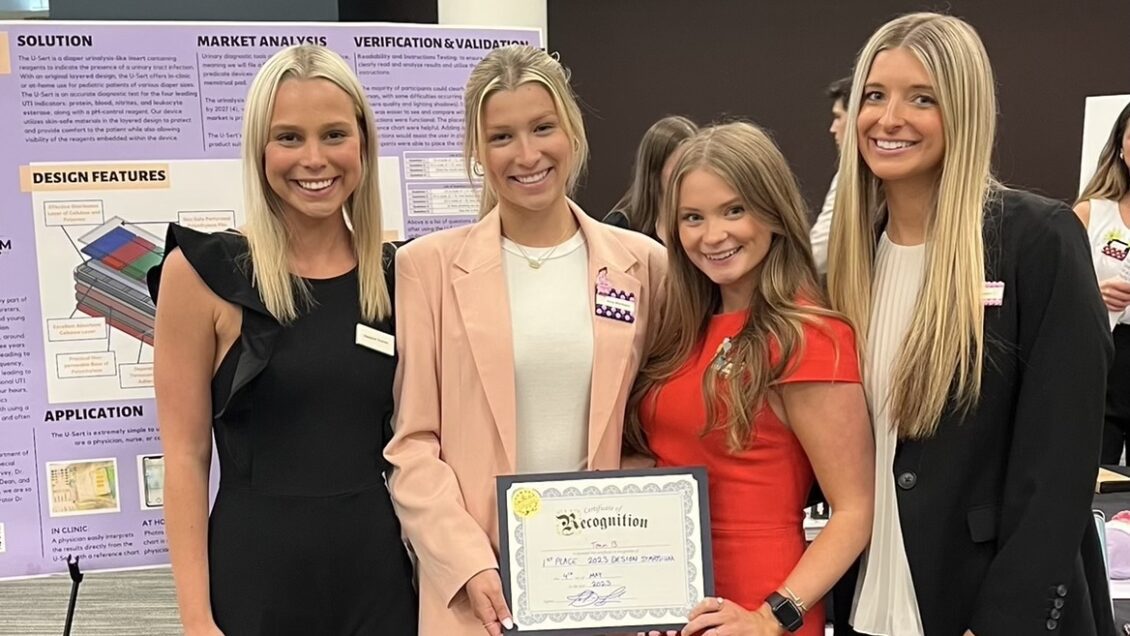Four recent Clemson University graduates will collect a national award this month for creating medical technology designed to help nurses monitor babies for urinary tract infections.
Reagan Hamm, Allie Beiter, Maddie Thomas and Anna Wichmann were students last academic year when they developed the U-Sert, which adheres to diapers and changes colors to signal when the child has an infection. (See the team’s pitch video here.)

All four all graduated in May and pursued further education or went on to professional jobs in healthcare. Their invention won a part of the DEBUT Challenge called the NINR Technologies to Empower Nurses in Community Settings Prize.
The DEBUT Challenge is a nationwide competition offered by the National Institute of Biomedical Imaging and Bioengineering and the nonprofit VentureWell.
The team’s advisors were John DesJardins, the Hambright Distinguished Professor in Engineering Leadership, and lecturer Tyler Harvey, both in bioengineering.
“The award is a testament to the brilliance and hard work displayed by Reagan, Allie, Maddie and Anna,” DeJardins said. “They have demonstrated a passion for making a positive difference and a willingness to disrupt the status quo. They are excellent ambassadors for Clemson bioengineering and I offer them my congratulations.”
The four Clemson students, who called their team RAAM Inc., learned in August that the U-Sert had won and that they will receive $15,000 in prize money. They will be presented with their award in Seattle this month at the Biomedical Engineering Society conference.
“I was already so proud of our team for all of the hard work we have dedicated to the U-Sert, but winning a DEBUT award really amplifies that feeling,” Hamm said. “It is so fulfilling to know that other people also see potential in our device, especially when it has the ability to make a positive impact on people’s lives.”
Beiter said working on the U-Sert added a sense of purpose to her studies and solidified her decision to pursue a career in healthcare.
“It also served as a reminder of how important communication is,” she said. “To ensure a cohesive, functional design, we had to communicate constantly within our team and with faculty members, clinical collaborators, and even medical device manufacturers. Communication is a skill that is invaluable regardless of career path.”
Thomas said the U-Sert work gave her an opportunity to apply what she learned as a Clemson student, build a tangible device and work with experts in clinical, industry, and academic settings.
“Currently, I am working with kidney transplant patients at the Medical University of South Carolina,” she said. Working on the U-Sert with our clinical collaborator, Dr. Sudha Garimella, M.D., of Prisma Health, gave me a great background in nephrology that I apply every day at my job.”
Wichmann, who is now an IPS planning engineer at KLS Martin, said the U-Sert project gave her a behind-the-scenes look at what goes into creating a medical device.
“I am currently working at a company that creates a variety of custom products for orthognathic surgery,” she said. “So, having that background knowledge of how things go from an idea to a fully functional device just helps me understand and appreciate the whole process that much more.”
Get in touch and we will connect you with the author or another expert.
Or email us at news@clemson.edu

